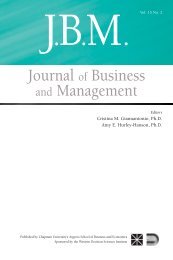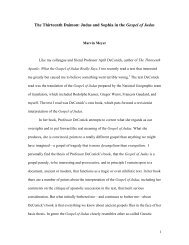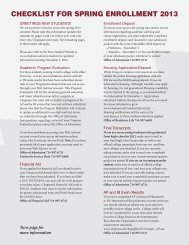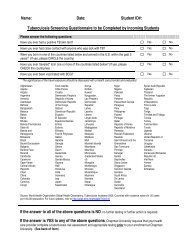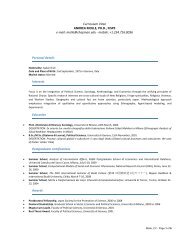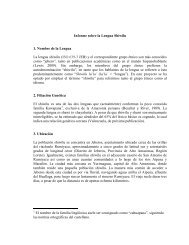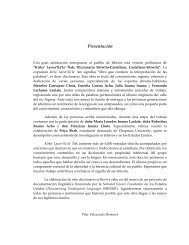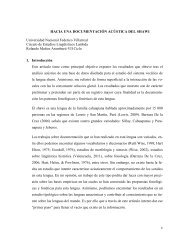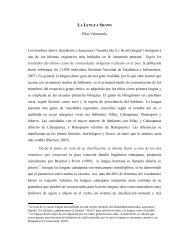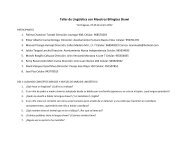“Surplus Humanity” and the Margins of Legality - Chapman University
“Surplus Humanity” and the Margins of Legality - Chapman University
“Surplus Humanity” and the Margins of Legality - Chapman University
Create successful ePaper yourself
Turn your PDF publications into a flip-book with our unique Google optimized e-Paper software.
Do Not Delete 12/12/2010 7:34 PM<br />
38 <strong>Chapman</strong> Law Review [Vol. 14:1<br />
<strong>and</strong> <strong>the</strong> switch to cash-crops are cited as <strong>the</strong> primary reasons. 250<br />
In 2007, <strong>the</strong> Planning Commission c<strong>and</strong>idly admitted that WTO<br />
―compulsions‖ had induced removal <strong>of</strong> tariffs <strong>and</strong> subsidies for<br />
<strong>the</strong> agriculture sector resulting in a ―major crisis‖ in <strong>the</strong> 1990s. 251<br />
Indeed, Bertolt Brecht had observed accurately that ―famines do<br />
not simply occur; <strong>the</strong>y are organised by <strong>the</strong> grain trade.‖ 252<br />
How does neoliberalism gain legitimacy in <strong>the</strong> face <strong>of</strong> its<br />
track record? This is accomplished through ―infiltration <strong>of</strong><br />
market logic into politics,‖ 253 <strong>and</strong> <strong>the</strong> deployment <strong>of</strong> ―an economic<br />
logic in defining, evaluating, <strong>and</strong> protecting certain categories <strong>of</strong><br />
subjects <strong>and</strong> not o<strong>the</strong>rs.‖ 254 In this transition, <strong>the</strong> neoliberal<br />
project is framed as ―government <strong>of</strong> free individuals who are <strong>the</strong>n<br />
induced to self-manage according to market principles <strong>of</strong><br />
discipline, efficiency, <strong>and</strong> competitiveness.‖ 255 Neoliberalism is<br />
about ―self-responsibilization.‖ 256 Responsibilities <strong>and</strong> capacities<br />
<strong>of</strong> <strong>the</strong> states, save perhaps for war <strong>and</strong> internal security, are<br />
shrunk. Historic popular expectations from <strong>the</strong> state are folded.<br />
Self-contained individuals, now ―freed‖ from <strong>the</strong> state, are to take<br />
responsibility to provide for <strong>the</strong>mselves, optimize <strong>the</strong>ir<br />
participation in <strong>the</strong> ―free‖ market, <strong>and</strong> not look to <strong>the</strong> state for<br />
any assistance or protection. 257 For <strong>the</strong> wealthy, this may lead to<br />
more wealth <strong>and</strong> consumption, but for <strong>the</strong> poor this just adds<br />
ano<strong>the</strong>r burden, <strong>the</strong> burden <strong>of</strong> responsibility, without any change<br />
in <strong>the</strong>ir capacity to shoulder it. Inequality is naturalized, <strong>and</strong><br />
<strong>the</strong> differentiated opportunities <strong>of</strong> life that come with it are<br />
deemed an inevitable part <strong>of</strong> <strong>the</strong> ―free‖ market.<br />
How do <strong>the</strong> Indian ruling elites square <strong>the</strong> heralded<br />
economic miracle with increased vulnerability <strong>of</strong> <strong>the</strong> vulnerable?<br />
How does neoliberalism displace historical commitments <strong>and</strong><br />
expectations <strong>of</strong> a caring <strong>and</strong> patrimonial state, particularly when<br />
250 P. Sainath, Neo-Liberal Terrorism in India: The Largest Wave <strong>of</strong> Suicides in<br />
History, COUNTERPUNCH (Feb. 12, 2009), http://www.counterpunch.org/<br />
sainath02122009.html.<br />
251 In <strong>the</strong> 1990s, <strong>the</strong> rate <strong>of</strong> growth fell below <strong>the</strong> rate <strong>of</strong> population growth for <strong>the</strong><br />
first time since <strong>the</strong> 1960s. Shah, supra note 243, at 80. The rate <strong>of</strong> growth <strong>of</strong> dryl<strong>and</strong><br />
crops that were grown <strong>and</strong> consumed by <strong>the</strong> poorest sections <strong>of</strong> <strong>the</strong> population dropped<br />
below zero. Id.<br />
252 Susan Marks, Introduction, in INTERNATIONAL LAW ON THE LEFT, supra note 135,<br />
at 1, 13. See also AMARTYA SEN, POVERTY AND FAMINES: AN ESSAY ON ENTITLEMENT AND<br />
DEPRIVATION 78–81 (1983); MIKE DAVIS, LATE VICTORIAN HOLOCAUSTS: EL NIÑO FAMINES<br />
AND THE MAKING OF THE THIRD WORLD 26–27(2001).<br />
253 AIHWA ONG, NEOLIBERALISM AS EXCEPTION: MUTATIONS IN CITIZENSHIP AND<br />
SOVEREIGNTY 6 (2006).<br />
254 Id. at 16.<br />
255 Id. at 4.<br />
256 See NIKOLAS ROSE, POWERS OF FREEDOM: REFRAMING POLITICAL THOUGHT 45<br />
(1999).<br />
257 Id. at 142.



